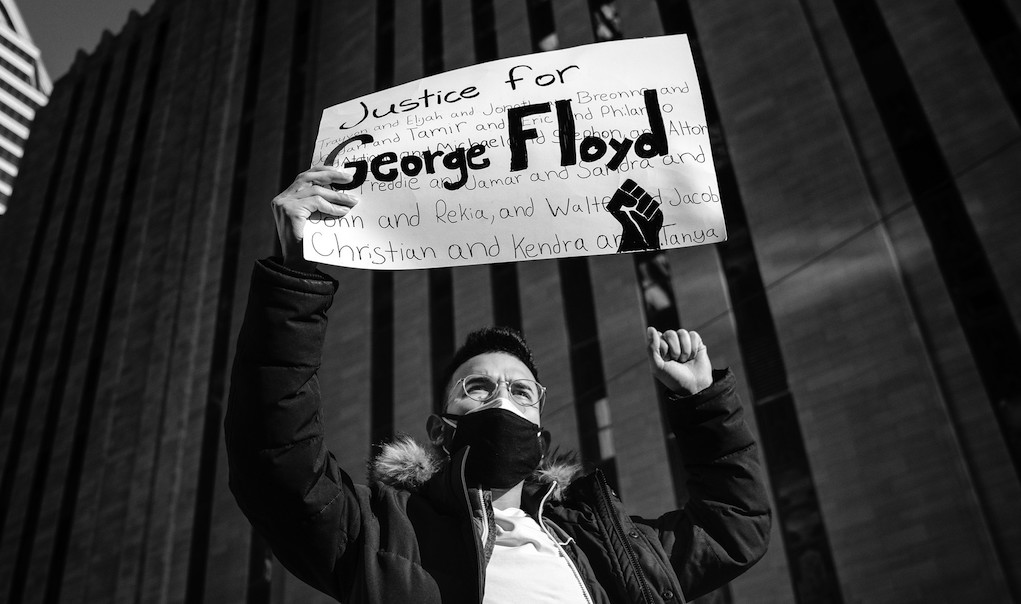The last televised trial that was a mass event in the U.S. was O.J. Simpson’s, in 1995. 150 million people watched the verdict, and not just there. People on Bloor St. gathered to listen over car radios.
The main lesson of that trial was: if you have lots of money, you have a decent chance at beating a murder charge, as Simpson did. If not, you’ll be crushed by the weight of the forces of Law & Order, DumDum. (The TV franchise had recently debuted.)
There was no one to like at that trial; everyone was already a star — O.J., the lawyers — or auditioning for their own show on cable, still in an early phase: Kato Kaelin got guest parts in Celebrity Boot Camp; Greta Van Susteren anchored on Fox News; prosecutor Marcia Clark did ET and other dreck.
Derek Chauvin’s trial isn’t in L.A. and no one seems to be career-building. It probably wouldn’t be televised except for the limits imposed by COVID, and there are likable people — especially in the first week, when witnesses to the killing testified. It reminded you that jury trials can be democratic mementos.
Like a mixed martial-arts fighter who happened on the event. As the legal titans held a sidebar to decide if he counts as an expert, the camera stayed on him, shaking his head in a worldly wise way. Charles McMillian, a local elder who broke down watching the tape. Kids and teens: “I was sad and kind of mad … I felt like I was failing him.”
They were blunt yet eloquent.
The lawyer-narrator in the classic novel Anatomy of a Murder mused about that quality after a witness told how a defendant entered a bar, killed someone and left — “like he was the mailman delivering mail.” He’d always been struck by poetry like that.
It became less interesting (and inspiring) when cops and experts took over in week two — though the lawyers still had to keep an eye out for class and race elements on the jury. So Chauvin’s lawyer gave as an example of a defendant “bargaining” with cops: “Hey man, just lemme sit down on the curb and I won’t make trouble.” Not something he’d say himself in that situation, but reflective enough of offensive stereotypes.
There was one revelation. All those cute TV medical examiners (ME, or coroners in Canadian) like Ducky in NCIS, and ironic forensic pathologists are really a deep part of the Law & Order complex, like cops, prosecutors and judges. Yet they’ve somehow steered clear of that image till now. Maryland’s former chief ME, who’d moved to the U.S. from South Africa in 1991, gave what looked like a pretty lax account of George Floyd’s cause of death, as a witness for Chauvin. It turns out he was involved in a strikingly similar case in 2018: handcuffed Black man held in “prone” position so he couldn’t breathe and died. He’s being sued over it.
There was even a Canadian moment, courtesy of another former ME called by the prosecution. She was asked by Chauvin’s lawyer about a Canadian study that says the prone position — in Floyd’s case, crushed into the pavement by four cops on top of him — has produced no deaths in Canada.
“Isn’t that amazing,” she marvelled. “Canada … I don’t know what’s different.” She said there’s not a forensic pathologist in the U.S. who hasn’t seen deaths from that tactic before Chauvin’s exasperated lawyer cut her off with an objection.
Both sides (as if there’s always two) have now “rested.” They’ll be back Monday to sum up, then it goes to the jury. So we’ll see.
It would be crazy to overstate the importance of this event. It’s basically symbolic. In fact “events” themselves are essentially symbolic, compared to the slow seismic causes moving underneath. Obama’s election wasn’t nothing, but it was basically symbolic and disappointing compared to hopes it aroused. The same holds for the end of South African apartheid in the early ’90s.
It’s a bit like therapy. There are exciting breakthrough moments that almost always fade compared to the deep, slow changes that people sometimes manage to make. Meanwhile, moments help sustain you.
Rick Salutin writes about current affairs and politics. This column was first published in the Toronto Star.
Image credit: Lorie Shaull/Flickr



